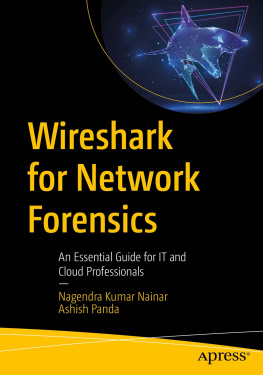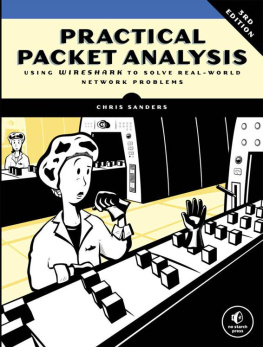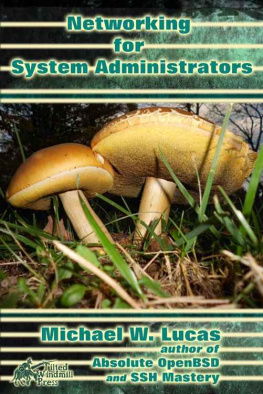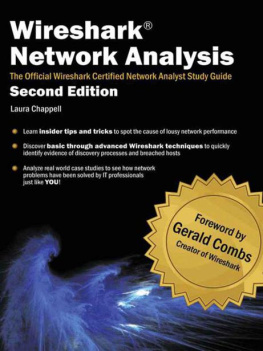Michael W. Lucas - Network Flow Analysis
Here you can read online Michael W. Lucas - Network Flow Analysis full text of the book (entire story) in english for free. Download pdf and epub, get meaning, cover and reviews about this ebook. year: 2010, genre: Computer. Description of the work, (preface) as well as reviews are available. Best literature library LitArk.com created for fans of good reading and offers a wide selection of genres:
Romance novel
Science fiction
Adventure
Detective
Science
History
Home and family
Prose
Art
Politics
Computer
Non-fiction
Religion
Business
Children
Humor
Choose a favorite category and find really read worthwhile books. Enjoy immersion in the world of imagination, feel the emotions of the characters or learn something new for yourself, make an fascinating discovery.

- Book:Network Flow Analysis
- Author:
- Genre:
- Year:2010
- Rating:5 / 5
- Favourites:Add to favourites
- Your mark:
- 100
- 1
- 2
- 3
- 4
- 5
Network Flow Analysis: summary, description and annotation
We offer to read an annotation, description, summary or preface (depends on what the author of the book "Network Flow Analysis" wrote himself). If you haven't found the necessary information about the book — write in the comments, we will try to find it.
Network flow analysis is the art of studying the traffic on a computer network. Understanding the ways to export flow and collect and analyze data separates good network administrators from great ones. The detailed instructions in Network Flow Analysis teach the busy network administrator how to build every component of a flow-based network awareness system and how network analysis and auditing can help address problems and improve network reliability.
Network Flow Analysis — read online for free the complete book (whole text) full work
Below is the text of the book, divided by pages. System saving the place of the last page read, allows you to conveniently read the book "Network Flow Analysis" online for free, without having to search again every time where you left off. Put a bookmark, and you can go to the page where you finished reading at any time.
Font size:
Interval:
Bookmark:
Copyright 2010
All rights reserved. No part of this work may be reproduced or transmitted in any form or by any means, electronic or mechanical, including photocopying, recording, or by any information storage or retrieval system, without the prior written permission of the copyright owner and the publisher.
No Starch Press and the No Starch Press logo are registered trademarks of No Starch Press, Inc. Other product and company names mentioned herein may be the trademarks of their respective owners. Rather than use a trademark symbol with every occurrence of a trademarked name, we are using the names only in an editorial fashion and to the benefit of the trademark owner, with no intention of infringement of the trademark.
The information in this book is distributed on an "As Is" basis, without warranty. While every precaution has been taken in the preparation of this work, neither the author nor No Starch Press, Inc. shall have any liability to any person or entity with respect to any loss or damage caused or alleged to be caused directly or indirectly by the information contained in it.
For Liz
PRAISE FOR ABSOLUTE FREEBSD, 2ND EDITION BY MICHAEL LUCAS
"Michael Lucas is probably the best system administration author I've read. I am amazed that he can communicate top-notch content with a sense of humor, while not offending the reader or sounding stupid. When was the last time you could physically feel yourself getting smarter while reading a book?"
"Master practitioner Lucas organizes features and functions to make sense in the development environment, and so provides aid and comfort to new users, novices, and those with significant experience alike."
PRAISE FOR ABSOLUTE OPENBSD BY MICHAEL LUCAS
"A well-written book that hits its market squarely on target. Those new to OpenBSD will appreciate the comprehensive approach that takes them from concept to functional execution. Existing and advanced users will benefit from the discussion of OpenBSD-specific topics such as the security features and pf administration."
"The potentially boring topic of systems administration is made very readable and even fun by the light tone that Lucas uses."
"I recommend Absolute OpenBSD to all programmers and administrators working with the OpenBSD operating system (OS), or considering it."
PRAISE FOR CISCO ROUTERS FOR THE DESPERATE, 2ND EDITION BY MICHAEL LUCAS
"For me, reading this book was like having one of the guys in my company who lives and breathes Cisco sitting down with me for a day and explaining everything I need to know to handle problems or issues likely to come my way."
"This really ought to be the book inside every Cisco Router box for the very slim chance things go goofy and help is needed 'right now.'"
PRAISE FOR PGP & GPG BY MICHAEL LUCAS
"Excellent tutorial, quick read, and enough humor to make it enjoyable."
"An excellent book that shows the end-user in an easy to read and often entertaining style just about everything they need to know to effectively and properly use PGP and OpenPGP."
"The world's first user-friendly book on email privacy. Unless you're a cryptographer, or never use email, you should read this book."
Thanks to all the folks who have attended my network flow analysis tutorial over the years, and whose questions, comments, and ideas motivated this book. Now that the book is out, I'll have to find something else to teach. And a special thanks to Mike O'Connor, who helped with the manuscript when he really should have been doing other things.

Network administrators of all backgrounds share one underlying, overwhelming desire. It doesn't matter if you manage a network with 400 separate manufacturing plants connected by a global MPLS mesh or if you're responsible for three computers and an elderly printer. Network administrators all share an abiding and passionate desire for just one thing: We want our users to shut up.
Blaming the network is easy. The network touches everything. Businesses assume that the network will work perfectly and make decisions accordingly. A user can't open that 900MB Excel spreadsheet on the file server on another continent from his 20th-century PC? Network problem. A website in Farawayistan is slow? Network problem. A user can't get a faster response over a 33.6Kbps modem? Network problem. In general, users don't care about trivialities such as the cost of bandwidth, the physical layout of transcontinental fiber, or the speed of light. They want the network to work the way they think it should.
This problem is exacerbated by the network's invisibility. Routers and switches are black boxes. You feed cables to the network, and it gives connectivity back. Traditionally, servers have much better activity logging and reporting than network devices. Sysadmins can write scripts to announce when a server process fails and try to remedy the situation, but very few network administrators have equipment that can monitor or repair itself. The usage information stored on a network device shows only the last few minutes at best. When a user reports an application failure, many systems administrators check their logs and report, "I have no problems. It must be the network." More sophisticated network administrators have traffic measurement tools such as MRTG, CiscoWorks, or OpenView, but these don't prove a network has no problems. They merely show whether the network has or lacks the particular set of problems that the software can report. The lack of media errors on a switch's uplink port says nothing about TCP/IP errors or firewall issues. With such minimal logging, blaming the network becomes very easy and hard to disprove.
In addition, modern-day network administrators typically have no formal certification or training process. The days of needing a computer science degree to manage a network are long gone. What network administration certifications exist are frequently for systems administration. An "operating system vendor-certified" network administrator is actually certified in the services that the operating system offers to the network, not the network itself. When you study for a Microsoft DHCP Server certification, for example, you learn some things about networking but a whole lot more about that particular DHCP implementation. Network service management is a useful skill, mind you, but it's not the same as managing the lowest level of the network. Network administrators learn the hard wayand it's a very hard way indeed.
This is a shame, because network administrators can claim a powerful role in any organization. The network administrator can help resolve almost every technical issue. The network administrator can make himself an invaluable, indispensable, and irreplaceable component of the organization. A network administrator who masters the tools, understands the protocols, and restrains his natural contempt for the lesser minds surrounding him will not be fired until the company dissolves around him.
Font size:
Interval:
Bookmark:
Similar books «Network Flow Analysis»
Look at similar books to Network Flow Analysis. We have selected literature similar in name and meaning in the hope of providing readers with more options to find new, interesting, not yet read works.
Discussion, reviews of the book Network Flow Analysis and just readers' own opinions. Leave your comments, write what you think about the work, its meaning or the main characters. Specify what exactly you liked and what you didn't like, and why you think so.








